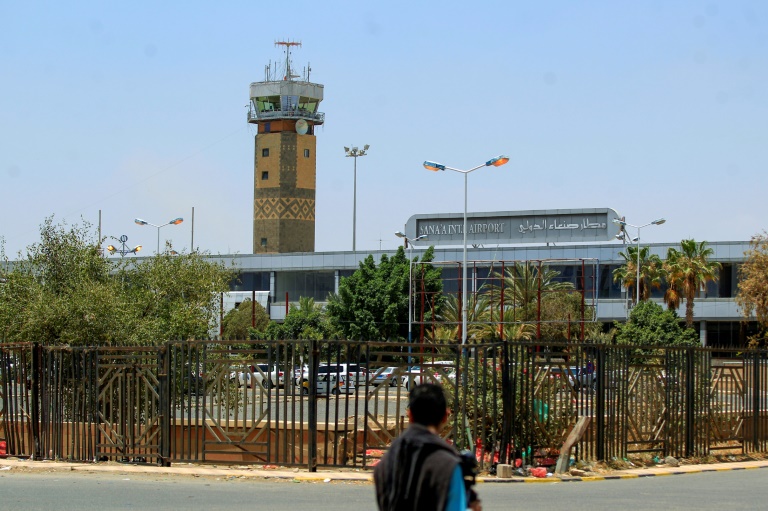First commercial flight in 6 years leaves Yemen’s rebel-held capital

Yemen’s Sanaa airport seen in this April 2022 picture has been closed to traffic since August 2016 because of air strikes by a Saudi-led military coalition fighting Iran-based Huthi rebels who control the capital
Sanaa – The first commercial flight in nearly six years took off from Yemen’s rebel-held capital on Monday, a major step forward in a peace process that has provided rare relief from conflict.
The Yemenia plane carrying 126 passengers, including hospital patients needing treatment abroad and their relatives, took off from Sanaa for the Jordanian capital Amman just after 9:00 am (0600 GMT), AFP journalists saw.
Before take-off, the plane with red-and-blue tail livery taxied through an honour guard of two fire trucks spraying jets of water.
Sanaa’s airport has been closed to commercial traffic since August 2016 because of air strikes by the Saudi-led military coalition, who are fighting Iran-backed Huthi rebels.
Yemen, the Arab world’s poorest country, has been wracked with war since the coalition stepped in to support the government in 2015, a year after the Huthis seized control of the capital.
According to UN figures, more than 150,000 people have died in the violence and millions have been displaced, creating the world’s worst humanitarian crisis.
But a truce has been in place since April 2, coinciding with the start of the Muslim holy month of Ramadan.
Five days after it took effect, Yemen’s Saudi-based president handed his powers to a leadership council tasked with holding peace talks with the rebels.
Resuming flights from Sanaa, reopening roads to the rebel-besieged city of Taez and allowing fuel tankers into the Huthi-held port of Hodeida — a lifeline for Yemen — were all part of the truce agreement.
While fuel tankers have docked in Hodeida and flights have now resumed from Sanaa, the main routes into Taez remain cut off.
The inaugural flight under the truce was planned for April 24 from Sanaa to Amman but had to be scrapped after Yemenia said it did not receive the necessary permits.
Each side blamed the other for the hold-up, while United Nations special envoy Hans Grundberg called for a quick resolution to the impasse.
The Norwegian Refugee Council aid group said at the time that the inability to operate commercial flights out of Sanaa had stranded “tens of thousands of medical patients” seeking treatment abroad.
Last week Yemen’s government said it would allow citizens in rebel-held areas to travel on Huthi-issued passports, removing a barrier to the flights.
The government has agreed “during the armistice period to allow the Yemeni people who were held hostage to the (Huthis) the opportunity to travel through Sanaa airport, with passports issued by Huthi-controlled areas,” a Yemeni official told AFP.
The government is “not responsible for any data contained” in the Huthi-issued documents, said the source, who spoke on condition of anonymity since they were not authorised to speak to the media.
